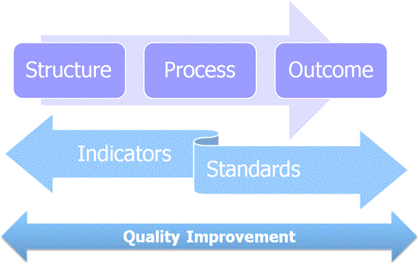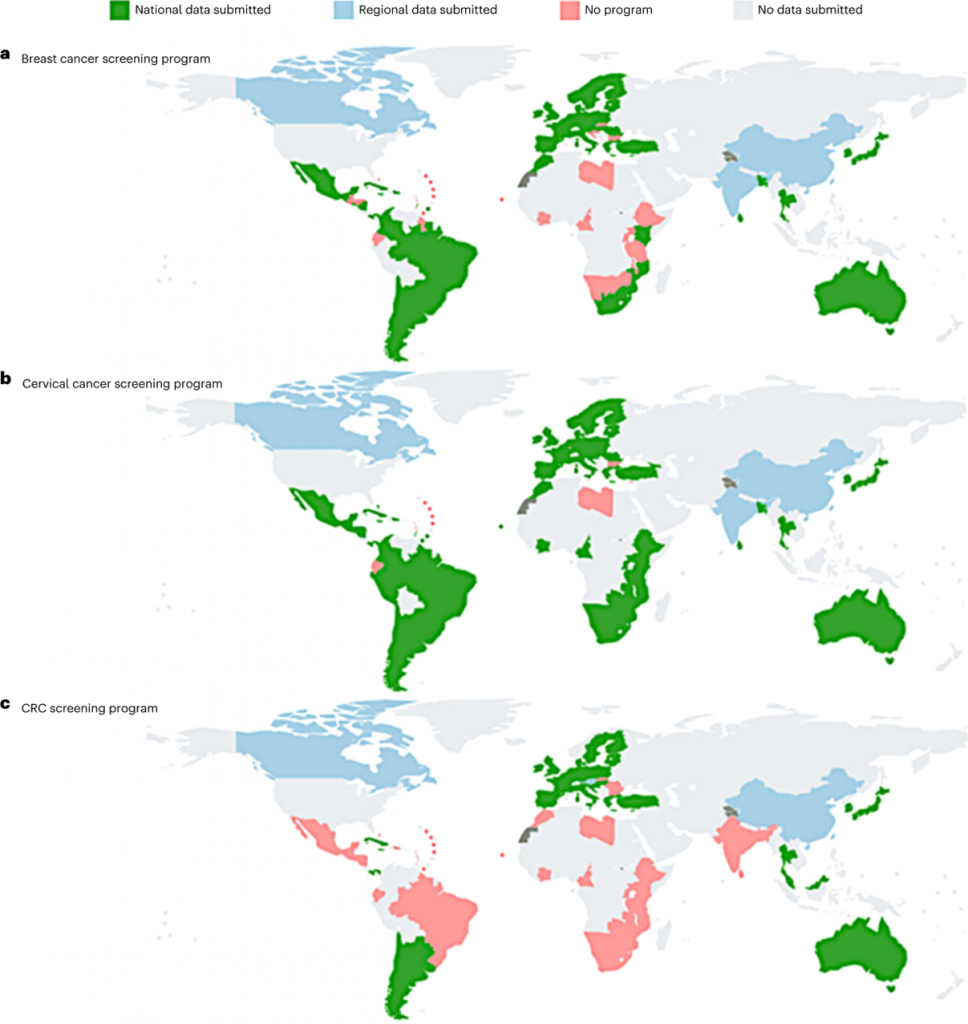
CanScreen5
Cancer Screening in Five Continents (CanScreen5) is a project analysing the organisation and implementation of breast, cervical and colorectal cancer screening programmes worldwide. It is the first initiative of its kind.
CanScreen5 is designed to improve the quality of cancer screening programmes globally. By creating a global data repository of existing cancer screening programmes, the project is expected to assist in generating and collecting high-quality data. This is with the accompanying aim of improved programme monitoring, evaluation and quality improvement longer term.

Framework of quality improvement
Credit: CanScreen5, IARC
CanScreen5 Report
The inaugural CanScreen5 report was published on 27 April 2023, in the journal Nature Medicine. It includes data collected from across 84 countries. These include 17 countries in Africa, 27 countries in the Americas, 10 countries in Asia, 29 countries in Europe, and 1 country in Oceania.
Led by scientists at the International Agency for Research on Cancer (IARC), the report highlights the substantial variability in the organisation and performance of cancer screening across different countries. It also provides recommendations for screening programmes, for improving the quality and completeness of respective data. Finally, it contributes to building an evidence-based set of best practices that can be shared between programmes internationally.
CanScreen5 Report: Findings
The report highlights the vastly differing levels of reported screening coverage across cancer types globally.
These range from:
- Breast cancer: 1.7% (Bangladesh), to 85.5% (England, United Kingdom)
- Cervical cancer: 2.1% (Côte d’Ivoire), to 86.3% (Sweden)
- Colorectal cancer: 0.6% (Hungary), to 64.5% (Netherlands)
However, report findings reveal that significant progress has been made in screening programmes globally. This includes the widespread implementation of cervical and breast cancer screening programmes worldwide, including in many low- and middle-income countries.
Many low- and middle-income countries have also invested in information systems for capturing screening programme performance data. Such information systems are crucial for improved programme implementation and monitoring.
However, many countries have yet to implement sufficient processes to measure key performance indicators. This is the case across a range of low-, middle- and high-income countries. Such performance indicators include data on follow-up care after a positive screening result, as well as cancer and pre-cancer detection rates across different screening services.

The status of data collection for breast cancer, cervical cancer and colorectal screening programmes globally
CanScreen5 Report: Recommendations
“This first report of the CanScreen5 project underscores the need for systematic collection of data to measure the performance of screening programmes,” says Dr Partha Basu, Principal Investigator of the project and Head of the Early Detection, Prevention and Infections Branch at IARC. “This will ensure [high quality data] and, through this, more equitable services.”
Building on CanScreen5, the following recommendations for improving data quality and completeness across different cancer screening programmes have been put forward:
- Conduct a thorough assessment of services associated with screening, based on information and data available
- Identify essential criteria for organised screening programmes currently either missing or with poor implementation
- Develop a feasible, measured and time-bound plan in consultation with all stakeholders, to improve the quality of services at different levels
- Dedicate an adequate budget for quality assurance, and put together a team responsible for implementing quality assurance where not already in place
- Build or strengthen information systems to capture performance data, to enable quantitative data collection tools to be completed and key performance indicators to be robustly estimated
- a). Create links with population datasets (such as electoral registers and birth registries), to be able to identify screening-eligible individuals
b). Create links with population-based cancer registries, to be able to monitor impact - Leverage the vertical investments made to improve surveillance systems, together with the mobile health applications used to mitigate against impacts of the COVID-19 pandemic
- Invest in capacity building of policymakers, managers and health professionals engaged in screening-related activities, to understand the value and application of quality assurance work
CanScreen5 Report: Next Steps
The CanScreen5 repository is a valuable resource for cancer screening programmes worldwide. Through its use, and with accompanying facilitation of shared best practices internationally, it can ultimately contribute to improved cancer screening outcomes.
“Capacity-building is a cornerstone of the CanScreen5 project,” says IARC scientist and co-author of the report Dr Andre Carvalho. “To achieve this goal, we are combining data collection with a ‘training-of-trainers’ model in various regions across the globe.”
“Our initial focus was on English-speaking countries in Africa, and on Latin America and the Caribbean. A recent publication brings together work assessing existing breast and cervical cancer screening programmes in Latin America and the Caribbean. In the next phase, we will expand our reach to French-speaking countries in Africa, alongside the European Union, Asia and the Middle East. This integrated approach is aimed at ensuring a consistently high standard of cancer screening programmes worldwide.”
For more information, please contact:
– Véronique Terrasse, Communications Officer (terrassev@iarc.who.int)
– IARC Communications (com@iarc.who.int)
The International Agency for Research on Cancer (IARC) is part of the World Health Organization. Its mission is to coordinate and conduct research on the causes of human cancer, the mechanisms of carcinogenesis, and to develop scientific strategies for cancer control. The Agency is involved in both epidemiological and laboratory research. It disseminates scientific information through publications, meetings, courses and fellowships. If you wish your name to be removed from our press release emailing list, please write to com@iarc.who.int.
.
The views expressed are those of the author. Posting of the blog does not signify that the Cancer Prevention Group endorses those views or opinions.
